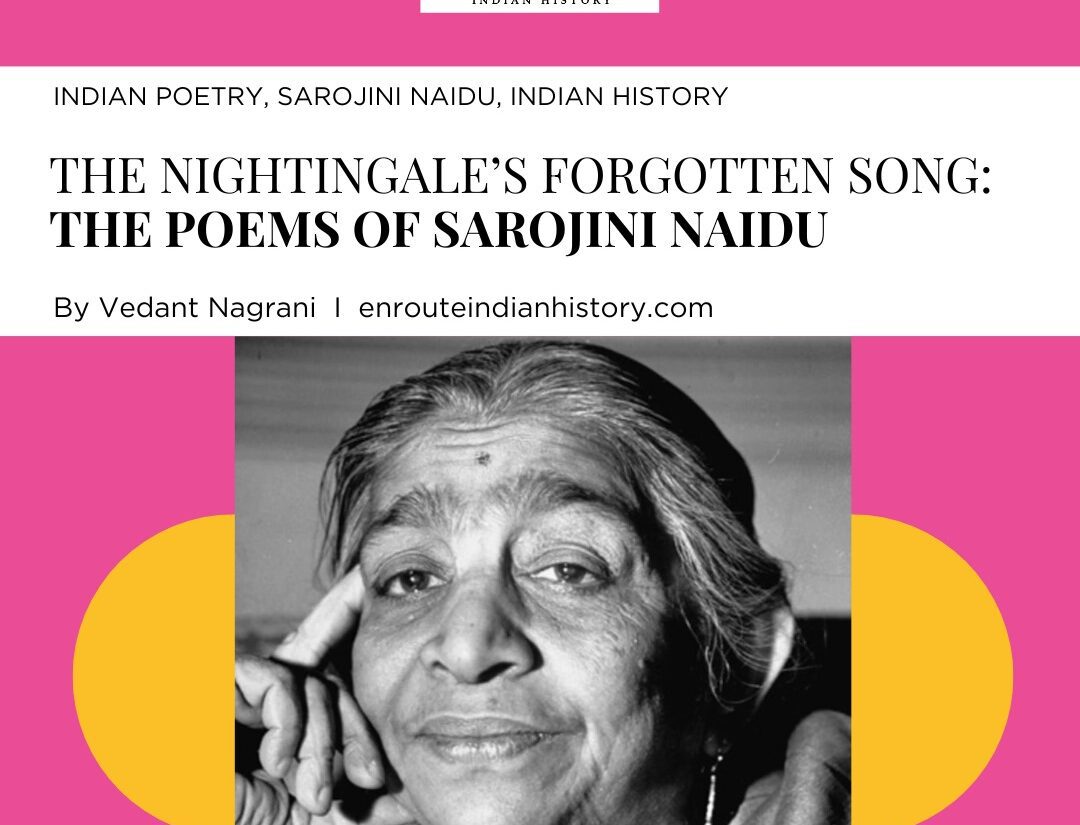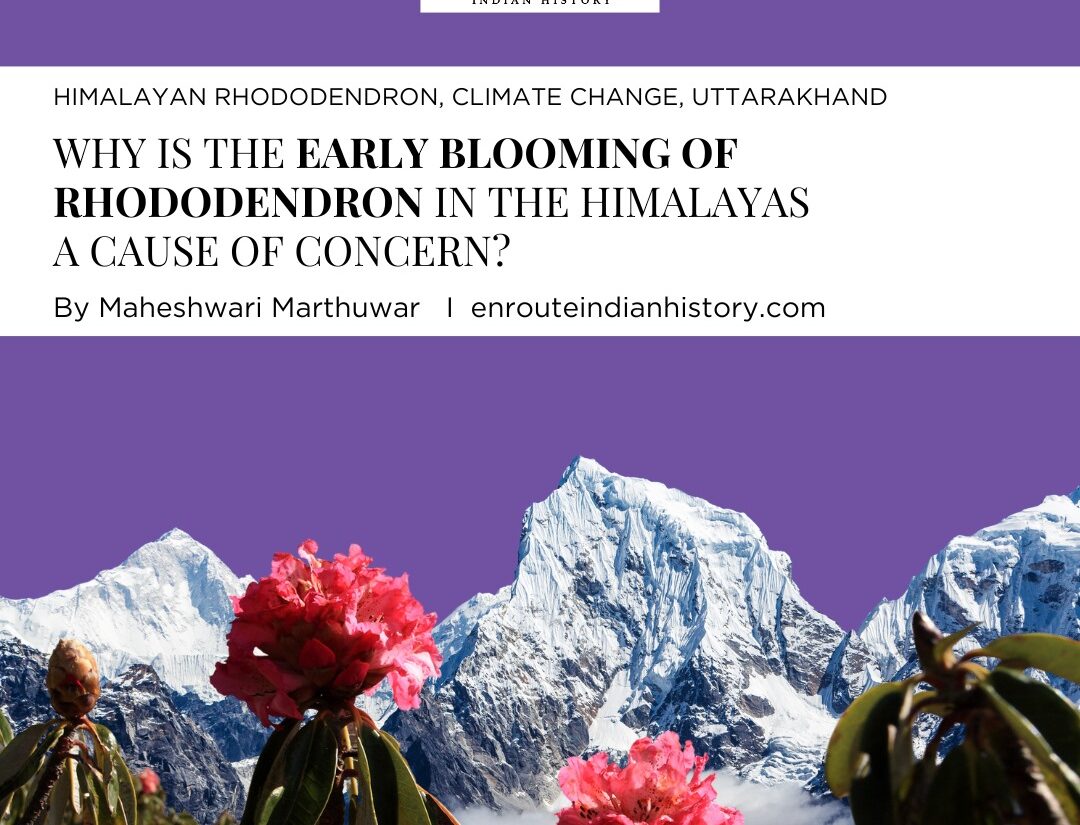The Nightingale’s Forgotten Song: The Poems of Sarojini Naidu
- enrouteI
- February 19, 2024

One of the most prominent Indian poets, Sarojini Naidu, though recognised as “The Nightingale of India” has often been underrepresented in anthologies of Indian English Poetry. Due to this underrepresentation, the nightingale’s songs have been forgotten despite her fame as a freedom fighter. Moreover, various postcolonial analyses of her work have also been highly misleading as they have dismissed her work without considering the context in which the poems were composed. This essay analyses the various criticisms of the poems of Sarojini Naidu using the lens of postcolonial studies and provides a defence of her poetics.
Though famously recognized as “The Nightingale of India”, Sarojini Naidu’s poetry is much lesser known than her involvement in the anti-colonial freedom struggle. The reason behind her underrepresentation is not a cultural amnesia but rather a heavy dismissal of her work by literary critics who deem it “oriental” in nature. Though Sarojini Naidu remains famous for her poems, it is not because of the celebration of her works but rather the contentions associated with her work in literary circles that continue to date. This contention arises from her writing style and content which has been criticized for being “Orientalist” in approach. Ironically, these criticisms, except for a few Indian scholars, have mostly been made by Western scholars whose very criticism reeked of Oriental ideas. Naidu’s poetics has been criticized on the grounds that her attempt to “imitate” the English Romantic poets whom she was deeply inspired by, involves a heavy emphasis on an “agony of sensation”, as conceptualized by Arthur Symons, an English critic and friend of Naidu, that leads to exotification of her subject matter, i.e. the Indian way of life.
While it cannot be denied that Naidu was inspired by the English Romantics, her poetry cannot be simply dismissed due to the same. Rather, several postcolonial critics have recently argued that this inspiration and act of imitation was deliberate and even subversive. Instead of merely dismissing Naidu’s work as Orientalist and treating artworks as self-sufficient autonomous entities outside the purview of history, these scholars undertook a postcolonial analysis of her works with a focus on her position as a female English-educated Indian poet writing in the language of the colonizer and speaking back to power in a language it can comprehend. These scholars further investigated the emphasis on senses and emotions in her aesthetics rather than merely dismissing it as an attempt to Indianise the English Romantics. According to Christin Hoene, Naidu employs the classical Indian aesthetic theory of the rasa in the form of her heavy reliance on the senses to “hark back to a pre-colonial cultural idea(l) in order to form a national identity that is independent of the colonizer’s political and cultural imperialism”. Critics such as Lotika Basu claim that the extensive use of imagery, colors, metaphors, and similes in Naidu’s poetry leads to “artificial”, “inauthentic” and “unrealistic” depictions of India. According to Basu, Naidu engages in self-orientalisation as her works continue the Oriental depictions of Indian bazaars, snake-charmers, and exotification of Indian women. Critics such as Basu do not recognize how the usage of senses in Naidu’s poetry is subversive rather than Orientalist as they involve usage of the rasa theory rooted in Indian sensibilities in the English language to present the “life and emotions” of Indians to the West, an objective that Ganapathi Agraharam Annadhurai Ayyar Natesan, an Indian scholar and writer, conceptualises as one of the key aims of Indian poets writing in English.
In the context of Natesan’s conceptualisation of the purpose of Indian poetry in English in colonial India, Naidu’s extensive use of metaphors does not seem to be oriental but rather subversive as it is based on the Indian theory of rasa deliberately translated into English to challenge Oriental ideas by an exercise of agency in a language and style accessible to the Western audience. This act has been termed “colonial mimicry” by the postcolonial scholar Homi K. Bhabha and it refers to the subversion of the politics of representation established by colonialism that only allow the coloniser to speak for the colonised as it engages in adoption of the coloniser’s language to subvert colonial ideas by replacing them with anti-colonial ideas. Naidu engaged in colonial mimicry deliberately as she did not have the social capital as both, a woman and as a colonial subject, to engage in a direct attack of Western colonialism in her own “unique” style as literature by women was not taken seriously, let alone literature from Eastern countries that challenged social norms in an outright fashion. Hence, as Sheshalatha Reddy argues, in order for her works to be given the desired readership essential for any significant change, she was forced to adapt to a language and style accessible to the Western readers whose attitudes could be changed with her cosmopolitan anti-colonial and nationalist outlook.

A Drawing of Sarojini Naidu by John Butler Yeats
Though several of Sarojini Naidu’s poems do seem to be rather archaic and self-orientalising, a closer investigation would reveal the impact of the rasa theory in the colours, scenes and landscapes that she describes in her poems and its relevance to the subversive politics of her poetics. Several readers and scholars tend to separate aesthetics and politics in their reading of poetry. However, poems are not autonomous entities and they are rooted in politics and historical context which provides an explanation for a lot of poetic choices that might seem rather absurd in the first encounter with these texts. Sarojini Naidu has been rightly called “The Nightingale of India” but the criticisms of her poems have mostly been unfair and unjust to her position as a woman from a colonized country engaging in subversive politics. Due to these uninformed criticisms of her poems, she has been evoked in literary circles only due to the contentions associated with her work that have prevented any serious celebration or study of her poems apart from the misconstrued debate on her supposed Orientalist beliefs. On the other hand, authors such as Rudyard Kipling who have themselves proclaimed their belief in Imperialism have been celebrated and widely studied in the English canon despite their racist and Orientalist outlook. The treatment of the poems of Sarojini Naidu brings attention to the essential question of canon formation and the politics of gender and race associated with it that must be done away with and democratized for any serious study of literature.
References
- Symons, Arthur. Introduction. The Golden Threshold, Naidu, Sarojini, 1905.
- Hoene, Christin. “Senses and Sensibilities in Sarojini Naidu’s Poetry.” South Asia: Journal Of South Asian Studies, vol. 44, no. 5, 2021, pp. 966-982.
- Basu, Lotika. Indian Writers of English Verse. University of Calcutta, 1933.
- Natesan, Ganpathi. Mrs. Sarojini Naidu: A Sketch of Her Life & An Appreciation of Her Work. G.A. Natesan and Co., 1917.
- Reddy, Sheshalatha. “The Cosmopolitan Nationalism Of Sarojini Naidu, Nightingale of India.” Victorian Literature and Culture, vol. 38, no. 2, 2010, pp. 571-589.
- May 15, 2024
- 6 Min Read

























